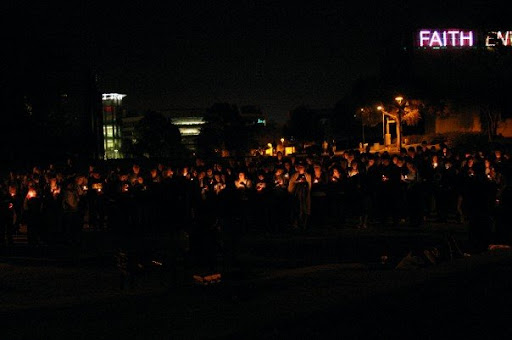
Some friends of mine are helping out with "Displace Me," an event being run by Invisible Children this weekend. I remember when Jason, Bobby, and Laren first screened their movie at USD and how incredibly naive they were. At that point they were three very immature idealistic guys with a funny documentary. Now they've turned that movie into a huge organization/movement working to end war and poverty in Uganda...it's a little crazy.
Displace me is a night of solidarity with the women, men, and especially the children displaced by war in Uganda. Thousands of young people around the United States are going to sleep out in cardboard boxes.
I commend the audacity of Invisible Children, but it's still hard for me to see beyond the fresh white faces who run the organization. I think it's great how much awareness their sleek marketing raises, but I still question what long term effect this all will have. Still, getting thousands of hyper-privileged U.S. youth and young adults to spend one night thinking about how so much of the world lives, that amazes me. At the same time I think back to that original screening. Bobby answered one of my questions by talking about branding. Every time a world conflict or disaster happens, NGOs show up and try to get the word out that they are there, so that the world knows that their "brand" is doing something. I wonder how much Invisible Children has become the "brand" for young adults who want to get involved with Africa. Still, they impress me. I mean, I'm writing a blog about they're idea "Displace Me."
Being displaced comes with a toll. The more we move outside the expectations of our culture, the more we feel like a stranger in our own world. I was amazed how much Mira Nair's new movie "Namesake" resonated with me when she had one of her characters speak about the U.S. as "That lonely country..." I think for most people it's pretty hard to figure out who you are, which seems to be much of the work you do in your teens and 20s...figuring out who you are/want to be. Adding to that a disavowal of what your own culture markets as "success" definitely complicates the matter.
But God calls us to be displaced. Jesus and his band of disciples lived radically displaced lives among the poor and the left out. As Christians, we are called to embrace every opportunity for God to break through the walls our culture builds around us, to actively work to break down the barriers between ourselves and others. That feeling of frustrated loneliness, confusion, mixed loyalties, can be holy. We are called to be homesick for the Kingdom of God, we miss a place that we are called to be part of bringing about. Until then we feel DisPlaceD.







